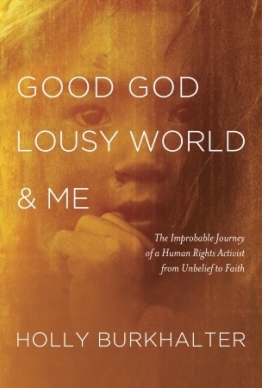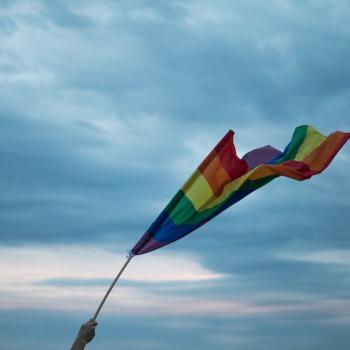 Holly Burkhalter’s unusual journey to faith is a refreshing reminder that God is always at work in our world. Growing up in a religious household, Holly moved away from faith as an adult and for years had nothing but judgment for the evangelical community. Her arrival in DC coincided with the rise of Falwell’s ‘Moral Majority,’ and it left a bitter taste in her mouth.
Holly Burkhalter’s unusual journey to faith is a refreshing reminder that God is always at work in our world. Growing up in a religious household, Holly moved away from faith as an adult and for years had nothing but judgment for the evangelical community. Her arrival in DC coincided with the rise of Falwell’s ‘Moral Majority,’ and it left a bitter taste in her mouth.
Yet at the same time, she was at the front lines of social justice, advocating for those around the world without a voice. In effect she was doing God’s work without believing in God. She was a witness to the brutalities of genocide, sex trafficking, rape, slavery, greed, and injustice. In her words, the injustice in the world cemented her disbelief in God. It was the classic, “If God is a good God, then why would he allow such evil in the world?” A moral dilemma that many have debated, for Holly it was more than hypothetical; she was a first-hand witness to the brutality of the world. In her own words:
I’m not sure I was an atheist. No self-respecting atheist would bother to curse God daily for misery and injustice as vigorously as I did for forty years. I must have believed in something good to have felt so betrayed and heartbroken by every day’s fresh load of cruelty and suffering around the world . . . I wanted there to be a God who was good and whose creation mirrored it, and it just wasn’t there. So perhaps the term for me was ‘twisted, pissed-off, betrayed, former Christian.’ I can’t find that in the dictionary, but it’s what I was (3).
From this background, God led Holly on an improbable journey to faith. How she arrived? A mixture of ‘pivotal circumstances’ and ‘providential relationships,’ to use Andy Stanley’s terminology. “I had met three deeply faithful people: a Ugandan land mine survivor, a Roman Catholic bishop, and a heart-on-her-sleeve evangelical doctor. They were spending their lives entering into others’ suffering, and they believed that is the great and good mission of the Christian church” (67). Holly’s turning point was her relationship with Gary Haugen and the International Justice Mission. Their witness to her provided the support needed for Holly to walk across the line of faith.
All in all, the book is an incredible read to gain insight into someone struggling with, and eventually overcoming, some of the toughest barriers one can put before faith.
Lessons Learned
1. It’s refreshing to hear of someone’s story outside the evangelical ‘bubble.’ Growing up inside the evangelical bubble, it’s easy to assume that our persuasion of faith is the only (or at least preferred) way for people to find God. Holly found God without ever sitting in a Sunday School class or walking down an aisle. Her closest spiritual influences are from ‘mainline’ denominations, denominations that many evangelicals quietly look down their noses at. And yet God is there, working in places we might not expect. I love that.
2. I have unending respect for those who work with social justice causes. Hearing Holly’s work with various organizations continues my unending respect for those who work on behalf of ‘the least of these.’ For many Christians, the Bible’s commands to look after the widow and orphan are metaphorical. For folks like Holly, it’s a literal way of life. Anyone who works in her field should be commended by Christians and non-Christians alike.
3. Holly Burkhalter cannot pinpoint the exact moment she became a Christian. I respect that. As uncomfortable as it may may some evangelicals, Jesus never commands his followers to ‘pray a prayer,’ ‘ask Him into their hearts,’ or ‘walk an aisle.’ He asks us to follow Him. Salvation is both a moment and a process. It’s something that began before creation and won’t complete until we’ve left this world. Many times, we like to dumb down the process, to the detriment of the act itself. Holly knows she’s a Christ follower, but she can’t pinpoint the exact moment it happened. That’s okay with me.
4. Her faith has survived one of the greatest moral questions posed by this generation. “If God is a good God, then why would he allow bad things to happen to good people?” A variation of this question has been posed by millions of people over the years. Considering the onslaught of evil in the world today, it’s one of the greatest arguments skeptics have to battle against God. Holly Burkhalter wrestled with this very question, in a tangible way that most armchair philosophers never will. And yet she came through the other side as a believer. If there’s hope for her, there’s hope for anyone.
5. Her belief in God was destroyed and then restored by other Christians. Her faith in God was destroyed by Christian relatives who walked through some very difficult times. Her belief in God was restored by other Christians who lived out their faith for her to see. As believers, we can never underestimate the impact our actions will have on the belief journey of those closest to us.
6. Be a Sharon. Sharon was the Christian friend instrumental in Holly’s salvation story. Sharon didn’t preach. She didn’t argue. She was present. She listened a lot. She displayed selfless love. She simply lived out her life and joy in Jesus, and she presented a peace that Holly longed to have. It’s a beautiful picture of how our lives should lead others to a relationship with Jesus.










